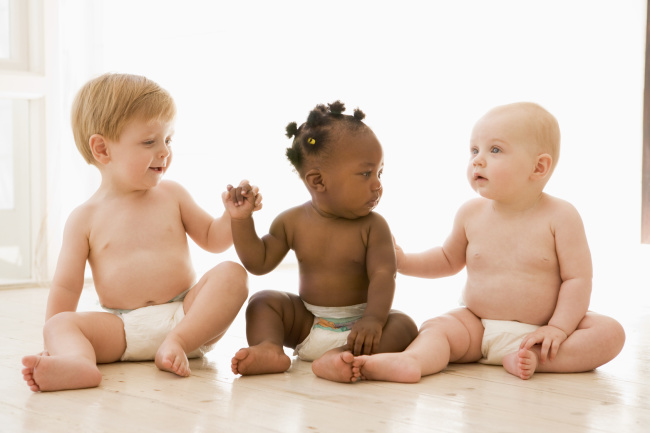At this age, the way your baby plays may be changing. Now that they have perfected the art of picking up and manipulating small objects with their hands, they may be interested in more energetic play to strengthen arms and legs. But you still need to focus on some of their finer movements as well as language and emotional development. Your baby will have met many milestones already, but you need to ensure their continued development.
Physical-motor development activities
- Allow your baby to draw large circles, using texture elements such as shaving cream, jelly, tomato sauce, etc. Let them draw lines right across the tray from top to bottom, diagonally and horizontally in both directions, using each hand respectively.

© blessings
- Use stickers and place them on the baby’s clothing and allow him or her to remove the stickers.
- Use clothes pegs and place them on your baby’s clothing, and they will need to remove the pegs.
- Allow your baby to climb over objects, up and down stairs and manoeuvre in whichever way they’d like. Let him explore, and use his body to stretch and manoeuvre himself.
- Sing rhymes and songs with your baby which will encourage movement as well as awareness of body parts.
- While playing with your baby, colours and crayons can be strategically placed so that he or she needs to stretch and move.
- Encourage your baby to kick a ball and throw and catch a big ball.
Social-emotional development activities
- Help your baby to develop problem-solving and decision-making skills.
- Avoid comments that are judgmental and instead, frame them in more positive terms.
- Encourage your baby in all that they do – let them know that you believe in them.
- Identify and highlight your child’s strengths.
- Provide opportunities for children to help around the house.
- Give children the opportunity to interact with children their age and with adults.
- Teach manners and respect.
Play development activities
- Allow children to play with toys and blocks, it is a great way of enhancing eye-hand co-ordination
- Puzzles are a fantastic aid in improving eye-hand coordination because children use their hands and fingers as a result of what is seen. This concept will serve well for children during their early maths, writing and reading practices.
- Beanbag game for eye-hand coordination is an excellent option, wherein children use their muscle power to move a series of beanbags. Beanbags can also be used to throw into a hoop, carry on their head, catching, etc.
- Interlocking building blocks are great ways to play while building fine motor skills and strengthening manual dexterity.
- Allow your baby to develop a sense of creativity and critical thinking skills by allowing the child to merely play, role-play, experience and explore their apparatus and environment.
Cognitive development activities

© Monkey Business
- Give your baby objects which can be used for imaginary play. This will aid their creative thinking skills.
- Allow your baby to build towers with bricks of wood.
- Encourage children to take part in household tasks, such as sweeping, cleaning, cooking, etc. This will give them a sense of purpose, as well as teach life-skills.
- Do not use baby words for objects. Call objects by the correct name.
- Action songs and rhymes, play and sing action songs and rhymes with your baby.
- Teach your baby the sounds associated with familiar animals and objects e.g a clock ticks, a sheep says b-a-a etc.
- Match shapes into the correct opening in a tub.
- Match objects, shapes and pictures with their pair.
Language and speech development activities
- Talk to your baby throughout the day – say the names of all the objects that you come into contact with.
- Introduce the child to names of shapes and colours. When you are explaining an 0bject say what shape it is, and the colour of the object. This will make the child aware of the words, and begin the learning process.
- Read stories to your baby – the more books a child is exposed to, the more their vocabulary will increase and the more they will understand.
- Allow your child to ‘read’ through the book in their own made-up language.
- Blowing Bubbles as this strengthens the mouth muscles in preparation for speaking.
- Allow your child to listen to a wide range of different types of music and develop music appreciation.
- Play and sing action songs and rhymes with your baby
That’s the WHAT and WHY. For the HOW, contact [email protected].
About the Author: Dr. Lauren Stretch is the founder of Early Inspiration, an organisation which aims to enhance the development of young children in South Africa through practitioner training and home interventions. She is one of the youngest PhD graduates in the country, and has completed her studies in the effectiveness of pre-school teachers, particularly in underprivileged settings, at the University of South Africa (UniSA).
Latest posts by Contributor (see all)
- Study: Length of labour doesn’t affect memory of childbirth pain - October 15, 2014
- Your baby at 12 months: Activities to support development - October 15, 2014
- Video: Michael Jackson’s ‘Thriller’ gets zombie mom makeover - October 15, 2014
-
No Comments" href="https://all4baby.co.za/newborns-0-6-months/2260/top-tips-help-baby-broaden-horizons/">

Top tips to help your baby broaden their horizons
-
No Comments" href="https://all4baby.co.za/babies-6-12-months/learning-development/2227/practical-activities-7-month-old-baby/">

Practical activities for your 7 month old baby
-
No Comments" href="https://all4baby.co.za/babies-6-12-months/milestones/2189/importance-babys-mouth/">

The importance of your baby’s mouth
-
No Comments" href="https://all4baby.co.za/babies-6-12-months/health-hygiene-illness/2186/practical-tips-fussy-eater/">

Practical tips for your fussy eater


 Saving...
Saving...